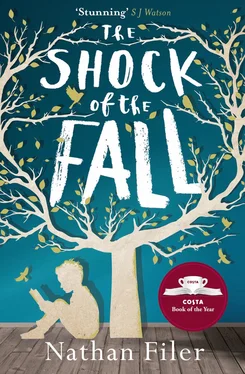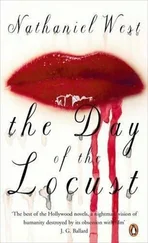If you’re a parent you can stop your children going to school, and sit them at the kitchen table with a workbook instead. Just write a letter to the head, and that is it. You don’t even need to be a teacher, although Mum was. Sort of. I should tell you about my mum, because you probably have never met her.
She is thin and pale, with cold hands. She has a broad chin that she is very self-conscious about. She sniffs the milk before she drinks it. She loves me. And she is mad. That will do for now.
I say that she was sort of a teacher because once upon a time she was going to be. This was when she was trying to get pregnant, but there were some complications and the doctors said that she might not be able to conceive. I know this stuff, without any recollection of being told it. I think she decided to become a teacher to give her life a meaning, or to distract her. I don’t suppose there is much difference.
So she enrolled at university and did the course. Then she got pregnant with Simon, and her meaning came kicking and wailing the regular way.
But she got to be my teacher. Each and every weekday, after Dad had set off for work, our school day would begin. First we would clear the breakfast table together, stacking plates and bowls by the sink for Mum to wash whilst I made a start on the pile of Key Stage exercise books. I was a clever child back then. I think that took Mum by surprise.
When Simon was alive he could be a bit of a sponge, soaking up the attention. He didn’t mean to or anything, but that is what special needs do – they demand more of the things around them. I seemed to go unnoticed. But sitting at the kitchen table, Mum did notice me. It might have been easier for her if I had been stupid. I only just thought that now as I wrote it, but it might be true. There were these tests at the end of each chapter of the Key Stage Science, Maths and French workbooks, and whenever I got everything right she would go quiet for ages. But if I only got nearly everything right, she would be encouraging, and gently talk me through my mistakes. That was weird. So I started making mistakes on purpose.
We never went out, and we never talked about anything except school work. That was strange too, because it wasn’t as if Mum acted like a teacher. Sometimes she would kiss me on the forehead or stroke my hair or whatever. But we just didn’t talk about anything except what was in the books. And that is exactly how the days unfolded for a long time, though I couldn’t tell you exactly how long in terms of weeks or months. It merged into one extended moment, with me sitting at the kitchen table doing my tests, and Mum talking me through my deliberate mistakes.
That is what I mean by my world slowing down, but it is hard to explain because it only takes a couple of pages to say how it was day after day. But it is the day-after-day that takes so long.
When my work was done I would watch cartoons or play some Nintendo. Or sometimes I would go upstairs and gently press my ear against Simon’s bedroom door, listening. Sometimes I would kill a bit of time doing that. We never talked about that either. Mum would make tea, and we would wait for my dad to get home. I should tell you about my dad, because you probably have never met him.
He is tall and broad, and stoops a little. He wears a leather jacket because he used to ride a motorbike. He calls me mon ami. And he loves me. That will do for now.
I said my mother is mad. I said that. But you might not see it. I mean, you might not think that anything I’ve told you proves she is mad. But there are different kinds of madness. Some madness doesn’t act mad to begin with, sometimes it will knock politely at the door, and when you let it in, it’ll simply sit in the corner without a fuss – and grow. Then one day, maybe many months after your decision to take your son out of school and isolate him in a house for reasons that got lost in your grief, one day that madness will stir in the chair, and it will say to him, ‘You look pale.’
‘What?’
‘You look pale. You don’t look well at all sweetheart. Are you feeling okay?’
‘I’m fine, I think. I have a bit of a sore throat.’
‘Let me feel you.’ She put the back of her hand against my forehead. ‘Oh, darling. You feel hot. You’re burning up.’
‘Really? I feel okay.’
‘You’ve been looking pale for a few days now. I don’t think you get enough sunshine.’
‘We never go out!’ I said that angrily. I didn’t mean to, but that’s the way it came out. It wasn’t fair of me either because we did go out sometimes. I wasn’t a prisoner or anything.
We didn’t go out much, though. And never without Dad taking us. I suppose that’s what I mean by saying how life can shrink into a house. I suppose I’m just ungrateful. Mum must have thought so, because she suddenly looked at me like I’d spat on her or something. But then she said very sweetly, ‘Shall we go for a walk? We could pop in to see Dr Marlow, he can look at your throat.’
It wasn’t cold, but she took my orange winter coat from the hook, and she zipped it right to the top with the hood pulled up. Then we stepped outside.
To get to the local GP surgery from our house, you had to walk past my school. Or rather, what used to be my school. Mum held my hand as we crossed the main road, and as we rounded the corner I could hear distant shouts and laughter drifting over from the playground. I must have resisted. I don’t remember doing so on purpose, but I must have done because as we got closer Mum’s grip on me tightened, taking hold of my wrist and pulling me along.
‘Let’s go back, Mum.’
We didn’t go back. We walked right up to the school, and along the whole length of the fence so that I was practically being dragged, with my stupid hood right over my eyes.
‘Is that you, Matthew? Hello Mrs Homes. Hello Matthew.’
I can’t think of her name now. Gemma, or something. It doesn’t matter anyway.
‘Hey, it’s Matthew!’
The thing is, I was even popular. The group of children who gathered at the fence did so because they liked me. They were my classmates and would have been shaken up by what had happened, and my sudden exit from their lives. But I didn’t talk to them. I can’t explain it. I looked straight ahead, hiding behind my hood, whilst Mum said, ‘Matthew isn’t very well today. Go back and play.’
Dr Marlow asked me to open wide. He looked inside my mouth, breathing his warm breath into me, smelling of coffee. There was nothing wrong with my throat that a few lozenges and some Lemsip couldn’t fix. He said I should get some rest. So that was that. Only it wasn’t.
It was just the start.
hypotonia n . a state of reduced tension in muscle.
There was the shock of the fall and the blood on my knee, and Simon carried me all the way back to the caravan, all by himself, without any help from anyone, even though it half killed him, but he did it anyway, he did it for me, because he loved me.
I already told you that.
And then I said there is a proper word for weak muscles, that I would look it up if I got the chance. And possibly you forgot all about it. But I didn’t. I didn’t forget.
There is a Nursing Dictionary kept in the office at the top of the back staircase, and I could see it there on the table. I could see it when I went to the office to ask if I could go on the computer for a while to do my writing.
It was really funny though, because the girl I asked (the young one with the minty breath and big gold earrings, who is forever trying to read over my shoulder), she just kind of froze. She was the only person in the office, and she totally froze, as if the Nursing Dictionary contains all these secrets that patients aren’t allowed to know. Seriously, she couldn’t even open her mouth.
Читать дальше












